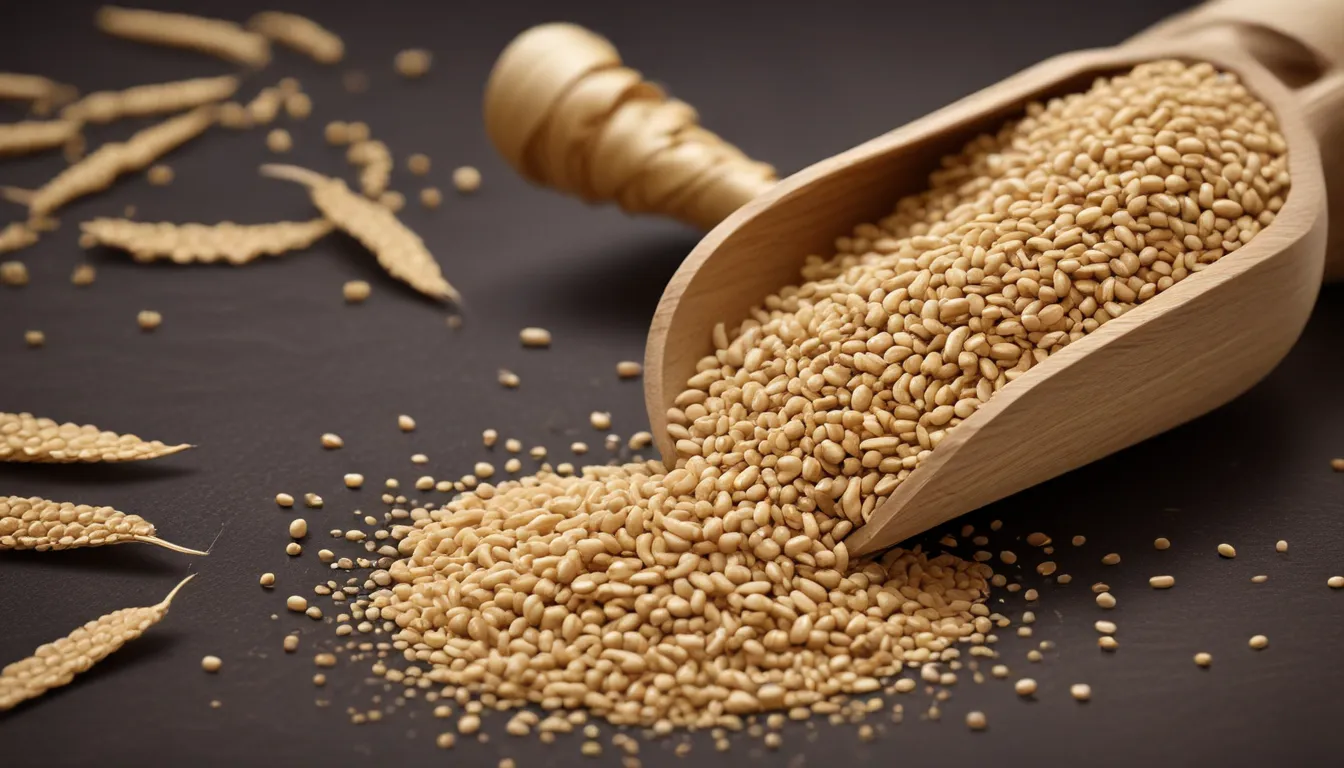The pictures in our articles might not always show exactly what the text is talking about. We use these images to make the article more interesting and eye-catching. They are there to add to the text, but not to replace it or show every detail.
Sesame seeds may be tiny, but they pack a powerful punch when it comes to nutrition and flavor. These small seeds have a rich history that spans thousands of years and are celebrated for their versatility in various cuisines worldwide. From their essential nutrients to their role in traditional medicine, sesame seeds offer a treasure trove of benefits waiting to be discovered.
Uncovering the Rich History of Sesame Seeds
Dating back to ancient times, sesame seeds were first cultivated in the Indian subcontinent and have been an integral part of culinary and medicinal practices throughout history. Their cultural significance and widespread use make them a fascinating subject to explore.
The Nutritional Value of Sesame Seeds
Sesame seeds are a nutritional powerhouse, packed with protein, healthy fats, fiber, and essential vitamins and minerals like calcium, iron, and magnesium. These nutrient-dense seeds offer a range of health benefits and can be a valuable addition to a balanced diet.
Exploring the Diversity of Sesame Seeds
Contrary to common belief, sesame seeds come in various colors, including white, black, and brown. Each variety offers a unique flavor profile and can be used in different cuisines and dishes around the world.
Embracing the Versatility of Sesame Seeds in Cooking
Sesame seeds can be used in a multitude of ways in cooking. From topping bread and buns to being a key ingredient in dishes like hummus and tahini sauce, these seeds add a delightful crunch and nutty flavor to a variety of culinary creations.
Unveiling the Flavorful Essence of Sesame Oil
Derived from sesame seeds, sesame oil is renowned for its distinctive and robust flavor. Widely used in Asian cuisines, this oil adds a beautiful aroma to dishes and enhances their overall taste.
Discovering the Role of Sesame Seeds in Different Cuisines
In Japanese cuisine, sesame seeds are a staple ingredient used in a variety of dishes like sushi, salads, and rice preparations. Similarly, in Middle Eastern cuisine, sesame seeds are essential in dishes like falafel, tahini, and halva, imparting a unique nutty taste.
Unearthing the Health Benefits of Sesame Seeds
Consuming sesame seeds can offer a plethora of health benefits, including lowering cholesterol levels, promoting heart health, supporting digestion, and enhancing skin and hair health. These tiny seeds are a powerhouse of nutrition and wellness.
The Ancient Healing Wisdom of Sesame Seeds
Sesame seeds have been used in traditional medicine practices like Ayurveda and Chinese medicine for centuries. Believed to possess healing properties, these seeds were utilized to treat various ailments and promote overall well-being.
Sesame Seeds – A Symbol of Fortune and Longevity
In certain cultures, sesame seeds are considered symbols of immortality, longevity, and prosperity. They hold significance in religious rituals and ceremonies, with the belief that they bring good fortune and blessings.
Sesame Seeds in Modern Culinary Delights
In contemporary baking and cooking, sesame seeds are a popular addition to various dishes, adding a crunchy texture and nutty flavor. From cookies to pastries, these seeds elevate the taste and visual appeal of culinary creations.
Embracing Sesame Seeds in a Gluten-Free Diet
For individuals on a gluten-free diet, sesame seeds offer a versatile and nutritious option. They can be used as a substitute in baking or as a topping for gluten-free dishes, providing a wholesome alternative.
Unlocking the Symbolism of Sesame Seeds in Asian Culture
In Asian traditions, sesame seeds are often associated with good luck, prosperity, and fertility. They are used in celebratory dishes to bring joy and blessings, highlighting their symbolic significance in cultural practices.
Tahini Paste: A Creamy Culinary Delight from Sesame Seeds
Tahini, a popular Middle Eastern condiment made from ground sesame seeds, adds a creamy and nutty flavor to dishes like hummus, dressings, and dips. Its versatility and rich taste make it a beloved ingredient in many cuisines.
Sesame Seeds: Nature’s Plant-Based Protein Source
For individuals following a plant-based diet, sesame seeds serve as an excellent source of protein. Incorporating these seeds into meals ensures a sufficient intake of essential amino acids for overall health and well-being.
Elevating Culinary Creations with Sesame Seeds
Gourmet chefs often use sesame seeds to enhance the flavor and presentation of their dishes. Whether as a garnish on fine dining plates or a key ingredient in gourmet recipes, these seeds add an element of sophistication and elegance.
Embracing the Culinary and Health Benefits of Sesame Seeds
In conclusion, sesame seeds offer a world of culinary delights and health benefits waiting to be explored. From their ancient origins to their modern-day culinary applications, these tiny seeds continue to captivate taste buds and nourish bodies worldwide. So, the next time you encounter sesame seeds in your meals, appreciate their nutritional value and flavorful essence as you unlock a world of possibilities.
Frequently Asked Questions about Sesame Seeds
- Can sesame seeds be harmful?
-
Sesame seeds are generally safe to consume, but individuals with sesame seed allergies may experience adverse reactions. Consult a healthcare professional if you have any concerns.
-
How should sesame seeds be stored?
-
Store sesame seeds in an airtight container in a cool, dark place to maintain their freshness and prevent rancidity.
-
Are sesame seeds a good source of protein?
-
Yes, sesame seeds are a valuable source of plant-based protein, especially beneficial for vegetarian and vegan diets.
-
Can sesame seeds aid in weight loss?
-
While nutritious, sesame seeds are calorie-dense. Moderation is key when incorporating them into a balanced diet to support weight loss efforts.
-
Are there alternatives to sesame seeds in cooking?
- Flaxseeds, chia seeds, and sunflower seeds can be used as alternatives to sesame seeds in certain recipes, bearing in mind differences in flavor and texture.
Sesame seeds offer a tapestry of flavors, nutrition, and cultural significance that enrich culinary experiences and promote well-being. Explore the world of sesame seeds, from their historical roots to their modern-day applications, and uncover the endless possibilities they bring to the table. Enjoy the journey of discovering and embracing the wonders of sesame seeds in your culinary adventures!






